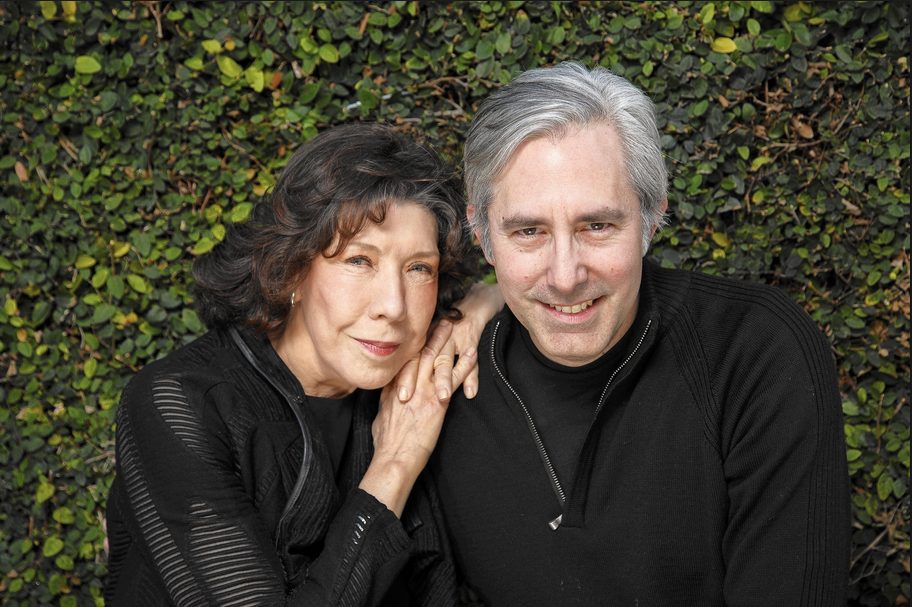Last Friday I joined a slew of LA critics at the London Hotel in West Hollywood for a press interview for Grandma– see my review here. Writer/Director Paul Weitz, Lily Tomlin, and Sam Elliott participated in a press conference and answered some questions. We begin:
What conversations did you have prior to filming regarding the romantic relationship between Judy Greer and Lily Tomlin?
Paul Weitz (PW): A lot. I wrote this script with Lily’s voice in it and I didn’t tell her… I asked her to lunch and kind of sprung this on her and asked if she’d read it. I felt that this movie was going to be important to Lily that everything be understandable and right. I also knew that Lily has so much to tell me about the character, which is the case with every excellent actor. I remember talking about what it’s like to enter a relationship with a fan – and Judy is a fan of Lily in the movie. I needed it to be somebody whose intelligence Lily would respect and I saw that in Judy. We talked a lot about what we didn’t want it to be. It was just as important to explore what her relationship was with the off camera character of Violet (Lily’s late long term love) and I used Jacqueline Woodson as her picture and that character’s spirit because it would be important in setting the scene. When I first wrote that relationship it was incredibly idealized and Lily pointed out to me that if this were a real long term relationship they would have fought and had moments on the out, and Lily helped me put that spin on that.
Lily Tomlin (LT): I’d look at her (Judy) and say, “She’s young isn’t she?” And my character say would say “She wouldn’t leave me alone what could I do?”
PW: Lily’s character says to Julia (her granddaughter), “I met with her out of ego, now I’ve written more in the last 4 months than in the 5 years prior to that and that’s what good sex will to do you.” I love how when she says that her granddaughter is seeing her grandmother without expecting her to say that.
What were the ways you got into this character?
LT: I think Paul really did write it with me in mind, from the outside I wouldn’t have said I was like Elle, but I think I must be a great deal like Elle because it was so easy, fluid, natural. There are things you have to transpose yourself on, but it was terribly natural to me and that was a blessing.
PW: We also had a lot of time to go through it and figure out why Lily’s character was the way she was.

What was it like working on a film of this scale after all three of you have worked on much bigger projects?
LT: The scale was incredibly freeing creatively, it was less about perfecting that one joke or that one scene and more relaxed and focused on the subtleties. I wasn’t even sure it would be funny until we screened at the Sundance closing night.
PW: It was nice for me because when you have a bigger budget you sometimes shoot things just to see if they will work or not with the story, and then you sometimes end up with great material or masterful performances that you just can’t find a place for when someone is trying to get you to get the film shorter. With this project we only shot stuff we knew would be on screen. The film changed remarkably little from page to the final project.
Sam Elliott (SE): On big movies, there is a lot of wasted energy, a lot of BS, and here we were working with $600,000 and only 18 days of filming, and therefore it felt much more intimate and real.
How much improv was added into the scenes?
SE: Not much. When you have a good script, which is why I was on this, you want to be true to a good script. I did my work, I memorized my lines ahead of time – which takes me a while – but I came prepared to work and deliver on this story. We shot my scene in sequence, which also made it very easy.
PW: Lily would sometimes question how a literate character would swear so much and a few of the f-words we took out, but then during filming she sometimes added in new ones of her own. It balanced out in the end.
Lily would sometimes question how a literate character would swear so much and a few of the f-words we took out, but then during filming she sometimes added in new ones of her own.
Lily – how was it to play a lesbian character?
LT: As I said before I’ve played so many characters I guess it’s good to play myself! I did have my own car and my own clothes, and I brought my own experience but still made it a distinct character while having plenty of my own perspective. There were things she said or did that I would never do.
Could you touch on the subject of abortions and how you handled it in a more authentic way?
PW: It’s easy to turn characters into statistics when you talk about something serious like an abortion, and I know that in Juno and other films abortion is discussed but never fully realized. Lily’s character has a great line about how “this is something you’ll think about every day for the rest of your life,” but Sage is a confident teenager and knows what’s best for her right then. We wanted it to be a personal film but also have a connection to society and where we are right now. For Lily’s character, getting an abortion would have been something very dangerous and definitely illegal, so she brings her own perspective to it while Sage is very much a teenager of the present day.
Sam, how do you keep such a deep voice over the years?
SE: (laughs) It’s not anything I do. My mother always had me in church choirs and a capella, it only gets deeper over the years, but it’s nothing more than gravity not anything I particularly work on.
What was it like working with Elizabeth Peña and did you know it would be one of her last roles? (She passed away recently)
PW: I had no idea it would be. We had a very fun time on set, she loved her character and her costume, and she got excited about her scene. In the scene where Lily insults her the ultimate feminist insult by calling her a silver-backed alpha male ape, she actually wanted to act like an ape and jump over the counter. It’s a tragedy this will be her last or one of her last performances.

Great use of props and clothing to efficiently create characters. Could you talk about what elements were pre-envisioned and then how those decisions came to be?
PW: It was definitely important to let go of pre-conceptions and figure out what was best for these characters. I had originally imagined Sam’s character to have a pony tail and be a biker, but we discussed and figured out what would be more authentic.
SE: A lot of the details paid off for these characters. For example, when we first see my character, we decided his jeans would not be tucked in properly – he’s been caught alone in this big house and despite having so many children he is alone. He isn’t expecting anyone. That small touch really added to the scene.
Can you talk about the anger in the film and how you managed to create angry characters but not be one-note?
PW: I love the title of “Grandma” because it conjures this really sweet image which ends up being ironic when she’s such a firecracker. We were dealing with three generations of women and how they each handled situations… the main thing is all these characters needed to be full of life because they all have much more life to live. This was never meant to be a swan song, or a “dying movie” but it leaves with a sense of optimism that there is more room to grow.
LT: The anger is the initial emotion or the gut reaction but it’s what leads her to express the hurt that’s underneath. The most emotional moment for me is actually a laugh, and when she lets go of her past troubles with a degree of optimism instead of sorrow. If that is going to play it’s gotta be on the page, and with this script it was, which made it very easy to fall naturally into.
H. Nelson Tracey
Nelson is a film director and editor from Denver based in Los Angeles. In addition to writing for Cinemacy, he has worked on multiple high profile documentaries and curates the YouTube channel "Hint of Film." You can check out more of his work at his website, hnelsontracey.com


